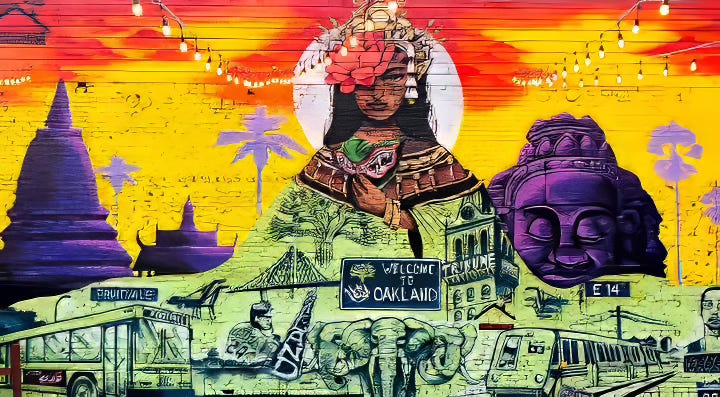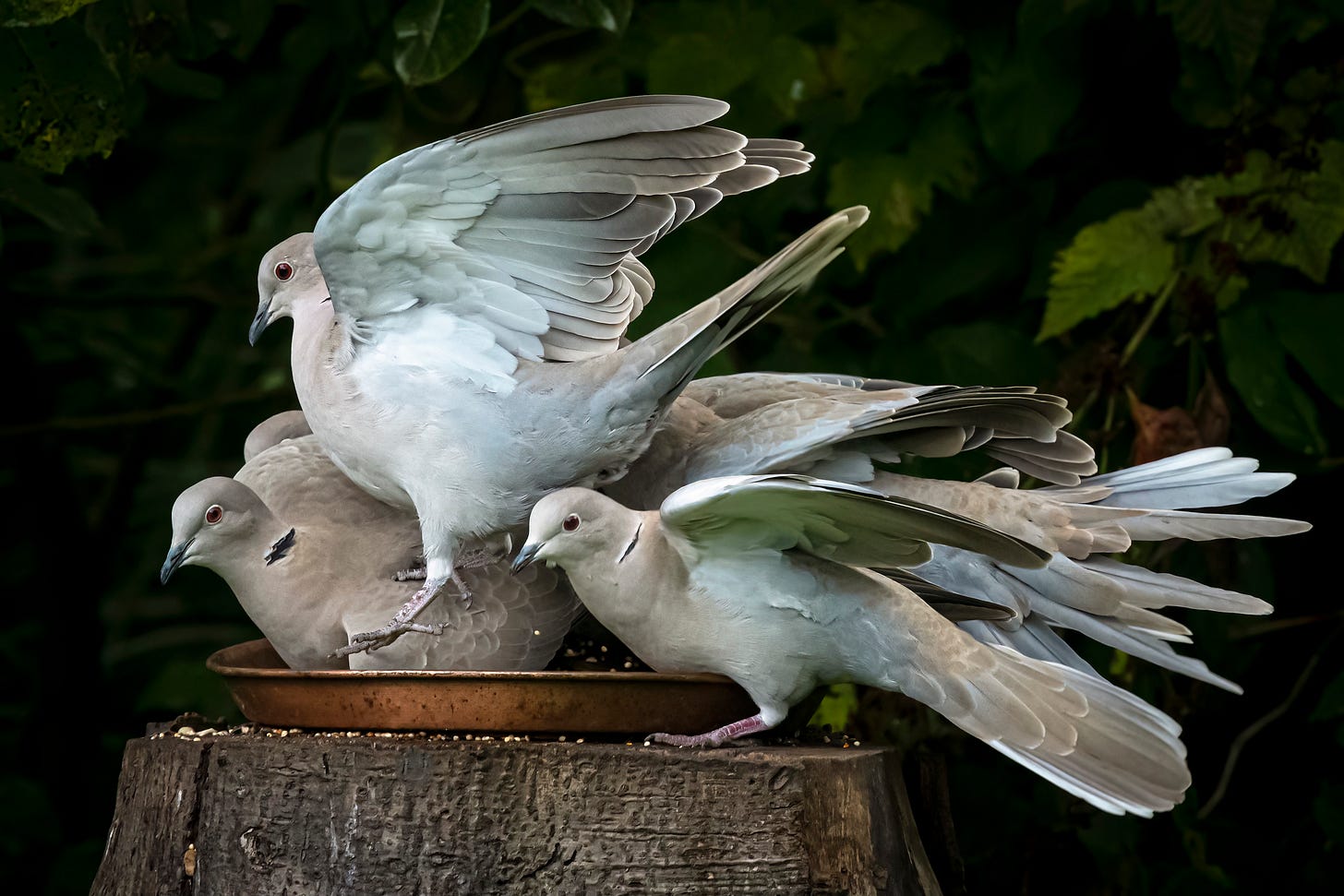The ties that bind
The Cambodian donut ladies and me. Plus a tribute to a murdered singer by a Khmer hip-hopper.
TALES FROM OAKLAND

A story of coffee and donuts
“WEAK TIES” ARE social interactions with people like the long-time checker at Safeway or the woman you see at the bus stop every day. They’re the people with whom you’re only slightly acquainted but always recognize. In a podcast I heard recently, a researcher said these interactions significantly contribute to your sense of well being. She noted that for many people, these weak ties were sharply curtailed during the pandemic, and that some of us have had a hard time re-establishing them.
As I listened to the podcast, a sudden memory returned of a little shop near the office where I worked for twenty years. When I first ventured in, I found a dark, cramped “convenience” store. They carried soft drinks and suspiciously off-brand candy, as well as cigarettes that were kept behind a grimy counter.
Ten years after that first encounter, some new owners turned it into a donut shop that served coffee. In the 80’s and 90’s, Cambodians largely took over the local donut businesses like this one. Some eighty percent of independently owned donut shops in California are run by Cambodian immigrants. The new owners quickly carved out a niche for themselves in our Oakland neighborhood, which was otherwise largely Black and Latino.
As a caffeine junkie who absolutely loves a donut, I had to check it out. The new owners had improved the lighting, cleaned up the place, and removed most of the clutter. Although still small, it felt larger and more airy.
After that, I came in two or three times a week. The coffee wasn’t terrible and the donuts were terrific. Although we had no language in common, the women who ran the place always greeted me. We traded smiles and I’d silently point at what I wanted. I would then walk over to a side counter with sugar, spoons, and tiny sealed cups of a cream-adjacent liquid that barely passed muster— the only significant fault in an otherwise stellar operation.
One day, coffee in hand, I was debating whether to pry open some of the tiny cups when someone standing next to me ordered a glass of milk with her donut. The hair-netted woman behind the counter nodded and walked to the refrigerator in the back where she retrieved a large carton of whole milk. She carried it to the front counter, poured some into a small glass, and handed it to the customer.
When I saw this, I gestured towards the carton, pointed to coffee, and pleaded, “Please, please!” She understood and poured the milk into my outstretched cup. Voila! In a heartbeat their operation went from stellar to supernova.
Over the next ten years I ate my way through dozens and dozens of donuts and many gallons of coffee. All the employees came to recognize me and brought me that carton of whole milk from the back, no words necessary. They were always exceedingly nice to me and I was a good tipper.
I loved my job but the day finally came when I was burned out and needed a change. My new job was ten miles away, with a different and lesser coffee shop. But a year later, I returned to the old neighborhood one day to meet a friend. I walked past the donut shop and suddenly wanted—no, needed—a cup of coffee. When I walked through the front door, I saw the Cambodian women whose names I didn’t know but whose smiles I instantly recognized. One poured me a cup of coffee. The other one wordlessly went to the back and got the carton of milk. –Barbara Ramsey
Check out the PBS documentary, The Donut King, about a Cambodian immigrant who started with nothing, created an empire of donut shops in LA, and then lost it all.
BEYOND DONUTS
Cambodians rock
AMERICAN SOLDIERS brought rock n’ roll to Southeast Asia during the Vietnam War. The music, from psychedelic musicians such as Jimi Hendrix and Jefferson Airplane, had a profound influence on the already vital music scene in Cambodia in the 1960s and 70s. When the Khmer Rouge overran the country, they killed the musicians who were unable to flee, including Ros Sereysotha, one of the most famous. An Oakland singer, Bochan, grew up with this music, a fusion of rock and traditional Cambodian music. She played with her father’s band at weddings, funerals, and cultural events in the immigrant community, before striking out on her own to blend yet another musical style from the hood—hip hop. A profile of the artist on KQED public television describes her trajectory. Bochan has produced her own version of Ros Sereysotha’s hit song, Chanam Oun 16, as a tribute to the singer and the others murdered by the Khmer Rouge.
BIRDS
Return to the scene
I AM HAPPY to report that I will be in Neah Bay next week staying at the Butler Motel and Natural History Museum, where I took this picture (my bestseller). I have previously described the 2019 trip. When I called Nancy Butler, who I’d helped with a little taxidermy problem, she immediately recognized me. Nancy told me that this picture has driven business to her motel. I don’t really know how, but I was happy to hear it. The Butler is a uniquely wonderful place and I can’t wait to return. Don’t tell her, but I plan to take her a print of the photograph. –KT
You can still see this picture and others in exhibition at the Port Townsend Marine Science Center Gallery through June 8, Friday–Sunday, 12–3.
Snippets
LOCAL SCIENTIST and birder extraordinaire, Steve Hampton, has produced an analysis of the steep decline of the Rufous Hummingbird—sixty-five percent from 1970–2019 according to one study. He examines the possible effects of climate change, logging, and competition from other species.
…a sparkling orange firecracker, our star, our exploding supernova of energy, the Rufous Hummingbird, brightening up our summers with fierce buzzing wings, a display flight with high-speed skid marks, and a song that sounds like two electric wires touching… touching… and then exploding.







Lyrics of the Chanam Oun 16:
This year I'm 16
This year I'm 16
There are no worries
Life is like flowers
Giving off a nice scent
Fa la la la la la la la
This year I'm 16
This year I'm 16
There are no worries
What is love?
Is it bitter, sour, or sweet?
Fa la la la la la la la
So touching! Made me crave a good cake doughnut! And try to remember -- if I ever knew -- how to say please and thank you in (Cambodian?). Also try to think of the "weak ties" we have accumulated in Port Townsend. Amy at BLTC comes to mind. Thank you for this thoughtful piece.